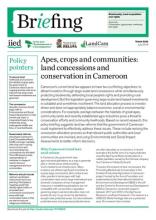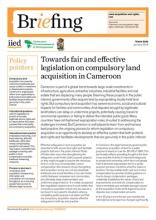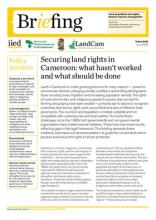/ library resources
Showing items 1 through 9 of 11.Cameroon’s current land law appears to have two conflicting objectives: to attract investors through large-scale land concessions while simultaneously protecting biodiversity, defending local people’s rights and promoting rural development.
Cameroon is part of a global trend towards large-scale investments in infrastructure, agriculture, extractive industries, industrial facilities and real estate that are displacing many people.
Land in Cameroon is under growing pressure for many reasons — powerful commercial interests, changing climate conditions and shifting demographic flows including mass migration and increasing population density.
Au Mali, au début des années 1990, la décentralisation fut d’abord un acte politique permettant de proposer une solution viable au problème de la rébellion touarègue.
This study provides a case study of the mango value chain in Kenya and seeks to better understand key linkages between land rights and project outcomes.
This guidance aims to provide companies with an overview of the links between land and human rights enshrined in these agreements and in official statements issued by treaty monitoring bodies.
The Business Enterprise Guidebook aims to help companies and investots understand how to facilitate a responsible investment in Ghana.
From the mid-2000s, a commodity boom underpinned a wave of land use investments in low- and middle-income countries.
This article reflects on the Tenure Guidelines as a tool for addressing resource governance challenges.
Pagination
Land Library Search
Through our robust search engine, you can search for any item of the over 73,000 highly curated resources in the Land Library.
If you would like to find an overview of what is possible, feel free to peruse the Search Guide.







